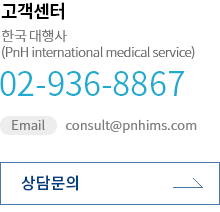면역치료 | 신장암 CAR-T 임상 CCT301
페이지 정보
작성자 HK HIS 작성일19-09-16 18:18 조회6,752회 댓글0건관련링크
본문
Brief Summary:
This is a two arm, open-label, dose escalation and dose expansion clinical study to evaluate the safety and efficacy of infusion of autologous CCT301-38 or CCT 301-59 T cells in adult subjects with relapsed and refractory stage IV metastatic renal cell carcinoma.Subjects with ROR2 positive biopsy will receive CCT301-59. Subjects with AXL positive biopsy that are ROR2 negative will receive CCT301-38.
Renal Cell Carcinoma
Biological: CCT301-38
Biological: CCT301-59
Arm | Intervention |
Experimental: CCT301-59 The safety and efficacy of CCT301-59 will be evaluated for subjects with ROR2 positive biopsy in a standard 3+3 dose escalation approach. 3 CAR T dosage will be tested in this study: 1×10^5/kg, 1×10^6/kg, 1×10^7/kg CAR+ T cells.
| Biological: CCT301-59 Subjects will undergo blood draw to isolate peripheral blood mononuclear cells (PBMCs) for the production of CCT301-59. During CCT301-59 production, subjects will receive a conditioning chemotherapy regimen of cyclophosphamide and fludarabine for the purpose of lymphocyte depletion. After lymphodepletion, subjects will receive one dose treatment with CCT301-59 by intravenous (IV) injection.
|
Experimental: CCT301-38 The safety and efficacy of CCT301-38 will be evaluated for subjects with AXL positive but ROR2 negative biopsy in a standard 3+3 dose escalation approach. 3 CAR Tdosage will be tested in this study: 1×10^5/kg, 1×10^6/kg, 1×10^7/kg CAR+ T cells.
| Biological: CCT301-38 Subjects will undergo blood draw to isolate peripheral blood mononuclear cells (PBMCs) for the production of CCT301-38. During CCT301-38 production, subjects will receive a conditioning chemotherapy regimen of cyclophosphamide and fludarabine for the purpose of lymphocyte depletion. After lymphodepletion, subjects will receive one dose treatment with CCT301-38 by intravenous (IV) injection.
|
Primary Outcome Measures :
- Phase I Safety (Incidence of adverse events defined as dose-limiting toxicities(DLT) [ Time Frame: Up to 28 days from cell infusion ]
Incidence of adverse events defined as dose-limiting toxicities (DLT)
- Phase II Objective Response Rate [ Time Frame: Up to 9 months from cell infusion ]
Objective Response Rate of confirmed complete and partial remission by independent radiology review RECIST (1.1)
Ages Eligible for Study: | 18 Years to 70 Years (Adult, Older Adult) |
Sexes Eligible for Study: | All |
Accepts Healthy Volunteers: | No |
Criteria
Inclusion Criteria:
1. Men or women aged 18~70 years old.
2. Patients are diagnosed as refractory / recurrent, Stage IV renal cell carcinoma by histological method with FDG PET signal > 3 SUV in measurable metastatic lesion.
3. Patients with at least two metastatic lesions, including one measurable metastatic tumor lesion >10 mm measurable by CT.
4. Tumor tissues samples confirmed CCT301 target positive IHC. Patient with histological biopsy.
o tumor tissue with greater than or equal to 50% positive staining by IHC method for ROR2 ;
o tumor tissue with greater than or equal to 50% positive staining by IHC method for AXL that is ROR2 negative.
5. Expected survival ≥12 weeks.
6. ECOG 0-1
7. Adequate organ function as documented by:
o ANC≥1.9X10^9/L
o PLT≥100x10^9/L
o Hb≥9.0g/dL
o rCCR≥50ml/min
o ALT and AST≤2.5ULN; for liver metastasis, ALT and AST ≤5ULN
o Serum TBiL≤3.0mg/dL, TBiL≤2.5ULN
8. PT: INR < 1.7 or extended PT to normal value < 4s
9. Adequate venous access for venous blood collection, and no other contraindication of blood cell separation
10. Patients with willingness to be in this study and able to provide informed consent
11. Capable of receiving treatment and follow up, included patients are required to receive treatment in the enrolled centre
12. Women of childbearing age are required to take acceptable measures to minimize the possibility of pregnancy during whole session. Women of childbearing age must have negative results of serum or urine tests within 24 hours prior to infusion. Women patients must not be in lactation;
13. Immunological detection
Exclusion Criteria:
14. Pregnant women or women in lactation.
15. Active HBV or HCV infection.
16. HIV/AIDS infection.
17. Active infection
18. Previously suffered from diseases or concurrent diseases as follows:
19. Patients confirmed as severe autoimmune diseases in long-term (over 2 months) need of systemic immune inhibitors (steroid) or as immune-mediated symptomatic diseases including ulcerative colitis, Crohn's disease, rheumatoid arthritis, systemic lupus erythematosus (SLE), autoimmune vasculitis (for example, Wegener's granulomatosis)
20. Patients with previous diagnosis as motor neuron disease caused by autoimmunity
21. Patients previously suffered from toxic epidermal necrolysis (TEN)
22. Patients with any mental diseases including dementia, mental status change that may impinge the understanding and performance of informed consent and related questionnaire
23. Patients with severe, uncontrollable diseases judged by investigator that may hinder them receiving this treatment
24. Patients with other previously active malignant tumors including basal or squamous skin cancer, superficial bladder cancer, and in situ breast carcinoma within 5 years who had been completely cured without the need of follow-up treatment are not excluded.
25. Ongoing treatment using systemic steroid or steroid inhalants.
26. Previous treatment used gene/cell therapy products.
27. Previous experience of immunotherapies including CIK, DC, DC-CIK, LAK for the treatment of cancer.
28. Allergic to immunotherapies or related drugs
29. Patients in need of treatment for heart failure with ≥2 NYHA or for poor controlled hypertension.
30. Patients with unstable or active peptic ulcer or alimentary tract hemorrhage.
31. Patients with previous organ transplantation or ready for organ transplantation.
32. Patients in need of anticoagulant therapy treatment (warfarin or heparin)
33. Patients judged by investigators as not appropriate for this study.






